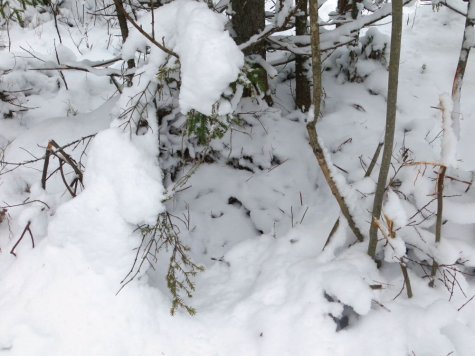Some bear mums have cubs in the den
Photo Ahto Täpsi
Translation Liis
A week ago a bear still slept in this den
Brown bear Pruunkaru Ursus arctos
About 700 brown bears inhabit the Estonian forests; of them about 140 are adult females. Up to 70 of those will give birth: some ”bear moms” already have cubs in the den, to others cubs will be born up to the beginning of February. Females are not sexually mature until 4-5 years old; after that they have cubs at intervals of 2 to 4 years. The lifetime of brown bears may reach half a century.
Female bears have a so-called delayed implantation (delayed embryonic development): it means that after the mating which took place between late April and June, the fertilized egg cell will attach to the uterus only after winter hibernation has begun. This means that the embryos develop in barely 2 months.
Brown bears have fattened up for the winter sleep with a decent store of fat. The winter hibernation is similar to a very shallow sleep: the body temperature drops to 32 degrees, heart beats about 10 times per minute, while when awake the pulse rate is about 40 beats a minute (Finnish and Russian scientists have studied bears for years, and they have access to bears too).
During the winter sleep the sedentary tract of the animals does not work – they do not defecate or eat but use up the accumulated fat during the sleep, about 300 grams per night and day period. Thus a creature of around 200 kilos may have lost 40% of the body weight until spring. The numbers are of course theoretical and depend on the particular individuals but give some idea of the hibernation process.
During the development of the foetus and when delivery time is drawing closer, the temperature of a pregnant female bear increases to the 37 degrees of summertime. Giving birth is a high-energy process: warmth is needed for the newly born as well as for the functioning of the mother’s mammary glands. The bear cubs are born blind and hairy and weighing about half a kilo; in a litter they are generally up to three.









